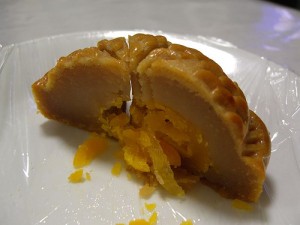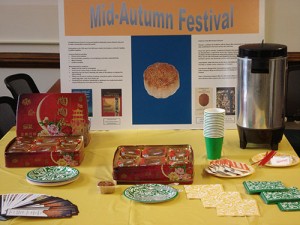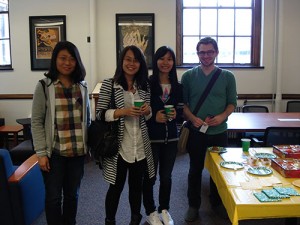Friday September 30th was the 2012 Mid-Autumn Moon Festival, also known as the Mooncake Festival, which is a holiday celebrated in Chinese and Vietnamese culture. The IAS had our own Mooncake festival celebration on Monday Oct 1st.
The tradition of eating mooncakes during this festival allegedly began with a “14th-century uprising against the Mongols, when word of the revolt was spread by concealing the message in cakes that were then smuggled out to compatriots.” (From “Mid-Autumn Festival (Singapore).” Holidays, Festivals, and Celebrations of the World Dictionary. Detroit: Omnigraphics, Inc., 2010. Credo Reference. Web. 02 October 2012. Retrieved from Credo Reference) Regardless of their origin, the eating of mooncakes is now an integral part of the Mid-Autumn Moon festival.
Traditional fillings include salted egg yolks, lotus seed paste, red bean paste, and nut pastes. More modern filling options include durian fruit paste, chocolate, cream cheese, and even ice cream!
Cut mooncake showing a traditional lotus seed paste filling around the salted egg yolk “moon.” Image by flickr user avlxyz, courtesy Wikipedia.
Mooncakes have been growing unfashionable in recent years, due to their richness and caloric density (usually about 800 calories per cake), but they still remain the go-to gift around this time of the year. They have even been called “the fruitcake of China.”
In defiance of fashion, all of the 88 mooncakes the IAS library bought were gone within a few hours!
Mooncakes and tea! Photography by Elizabeth Svoboda.
Some students enjoying mooncakes. From left to right: Jijin Xue, Zhao Miunyn, Fengna Su, and Thaddeus Andracki. Photography by Elizabeth Svoboda.
If you’re interested in learning more about the mid-autumn moon festival, check out these resources:
Library Books
- Folk customs at traditional Chinese festivities. Compiled by Qi Xing ; translated by Ren Jiazhen ; illustrated by Yang Guanghua. Main Stacks, call number 394.26951 F718. Catalog record.
- The Chinese at play: festivals, games and leisure. Edited by Anders Hansson, with Bonnie S. McDougall and Frances Weightman. Education and Social Sciences Library, call number 306.480951 C441. Catalog record.
- Chinese traditional festivals. Marie-Luise Latsch. Main Stacks, call number 394.26951 L355C. Catalog record.
Links
- How to Make Mooncakes, for the very adventurous cook!
- Fly Me to the Mooncakes, a roundup of 2012’s most creative mooncakes, including offerings from Dunkin Donuts, Dairy Queen, and even Angry Birds mooncakes.







